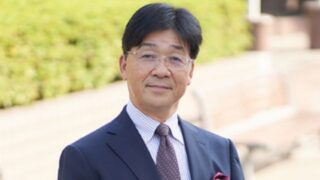Both the Universal Peace Federation and deprogramming victim Toru Goto seek damages from a reporter famous for his anti-Unification-Church campaigns.
by Massimo Introvigne


Two lawsuits filed this month in Japan will test both the independence of Japanese courts and whether unpopular groups can be accused of almost anything with impunity. Democratic countries protect freedom of speech, which certainly includes criticizing groups one does not like. There is, however, a clear line separating harsh criticism from outright lies.
Many (including the undersigned) may have, for example, a very negative opinion of QAnon and expose it for its dangerous conspiracy theories. However, even QAnon ringleaders are protected against the same kind of false accusations they propagate against others. If I would write that certain QAnon activists have been paid millions of dollars by the Russian Embassy for their pro-Putin posts, or have a criminal record for child abuse, and can supply no evidence for these accusations, I will probably be sued and will have to pay damages—and rightly so. The argument that QAnon plays a negative social role may be used to justify vitriolic criticism, but would not excuse statements about its leaders that are demonstrably false. This is how democracy works. Only in totalitarian regimes such as Russia and China opponents or groups labeled as “undesirable,” including some minority religions, can be accused of everything and have no way of protecting themselves.
Eight Suzuki is a Japanese journalist that converted attacking the Unification Church (now called the Family Federation for World Peace and Unification) and other “cults” into a cottage industry and a lucrative business. This is, in my personal view, immoral, but is not illegal. Since prejudice against minority religions stigmatized as “cults” is widespread in Japanese society and media (and has extended to foreign reporters based in Japan), Suzuki has even won awards.
The question, however, is whether in a democratic country somebody like Suzuki should be allowed to publish false statements against the Unification Church, its members, and organizations related to it and get away with his lies by shielding himself under the argument that the church is an allegedly “anti-social” organization that the Japanese government is seeking to dissolve. Japanese courts of law should now answer this question in two separate lawsuits.
The first has been filed by the Universal Peace Federation (UPF), an NGO with general consultative status at the United Nations that has been founded by the late Reverend Sun Myung Moon, who also founded the Unification Church, and his wife Dr. Hak Ja Han Moon. As documented in a White Paper published by “Bitter Winter,” while not hiding in any way its connection with the Unification Church, the UPF does not proselytize on its behalf and the vast majority of those who participate in its events and are active as “ambassadors for peace” are not members of the Family Federation.
The assassinated Prime Minister of Japan, Shinzo Abe, participated via video in one UPF event held in South Korea in September 2021. Eight Suzuki repeatedly stated that Abe was paid fifty million yen ($334,000) for this video message. UPF maintains that Abe received no compensation at all. Suzuki’s allegations also slander the memory of Abe, who would have violated the Political Funds Control Act and evaded taxes. While Suzuki is trying to create a smokescreen claiming he is persecuted by UPF for his criticism of its connections with the Unification Church, the issue is much simpler. Either the UPF paid fifty million yen to Abe for its video message, or it didn’t. If Suzuki has no evidence that the sum was paid, he propagated a lie damaging the plaintiff UPF and should pay damages for it. Whether UPF is a good or bad organization and what exactly are its connections with the Unification Church is not the subject matter of the lawsuit. The only question the court should examine is whether Suzuki has any evidence that UPF paid fifty million yen to Abe. If this evidence does not exist, the court should declare Suzuki a liar and a slanderer and make him pay for it.
The second lawsuit is by Toru Goto, the most famous victim of the obnoxious crime of deprogramming, the practice born in the U.S. and later exported to Japan of kidnapping adult members of groups stigmatized as “cults,” keeping them imprisoned, and bombarding them with negative information about their religious movement and other forms of physical and mental violence until they would give up their faith. Western democratic countries outlawed deprogramming in the past century, but it survived in Japan—until the Toru Goto case. He was kidnapped, kept in seclusion, malnourished, and abused for the incredible time period of twelve years and five months. When his calvary finally ended, he looked like a survivor from a Nazi concentration camp.


In 2014 a High Court decision (confirmed by the Supreme Court in 2015) reconstructed his ordeal in detail and awarded him significant damages. It also explicitly rejected two defenses: that the fact that the Unification Church was an “antisocial” organization justified kidnapping and illegally detaining its members; and that Toru Goto submitted to deprogramming “voluntarily” because after some initial attempts he no longer tried to escape. The High Court wrote that Toru Goto “was well aware that he would be blocked if he simply tried to escape, based on his previous experience and the fact that there were people in their neighborhood who were involved in the deprogramming activity, and that on the contrary it would result in the opposite effect where he would be more strictly monitored. Therefore, it is ruled that this [not trying to escape] was not due to the Appellant’s [Toru Goto’s] voluntary will.”
The case was closed, with a final decision by the Supreme Court. It put an end to the criminal practice of deprogramming in Japan, which had made more than 4,000 victims among Unification Church members only, not to mention that devotees of other religious minorities were also kidnapped for the same purpose.
Well aware that the Toru Goto case is a stain on the reputation of the anti-cult movement in Japan, whose lawyers and journalists largely (although not unanimously) supported the deprogrammers, Suzuki repeated the old argument that Toru Goto submitted to deprogramming voluntarily. Worse, Suzuki qualified Toru Goto’s case as one of “hikikomori,” referring to a peculiar Japanese phenomenon affecting hundreds of thousands of young men and women who withdraw from society and spend most of their time in their rooms as recluses, financially supported by their parents or social security.
Toru Goto has also sued Suzuki for severely damaging his reputation. Obviously, the voluntary seclusion of the “hikikomori” and being kidnapped, confined, and abused by others are very different matters. In this case, the court should not even ascertain what really happened to Toru Goto. This investigation has already been done by the High Court and the Supreme Court in 2014 and 2015. They have unequivocally rejected the defense by Goto’s relatives and deprogrammers that he submitted to deprogramming and abuse voluntarily. Suzuki repeated this preposterous theory that had already been exposed by courts of law as false. Unless he can prove that the highest country in the court was wrong, Suzuki has slandered Goto’s reputation and should be punished. Once again, whether the Unification Church is a good or bad organization is not part of the lawsuit.


Not surprisingly, Suzuki claimed, when he appeared at the press conference by Toru Goto and his lawyer and in subsequent interviews, that his right to free speech is being violated and these are SLAPP suits (Strategic Lawsuits Against Public Participation), typically used by large organizations to silence their critics. This is yet another false claim. Neither the UPF nor Toru Goto ask the courts to prevent Suzuki from criticizing them or the Family Federation. The lawsuits are against two specific statements by Suzuki: that the UPF paid fifty million yen to Shinzo Abe for a video message, and that Toru Goto submitted to deprogramming and abuse voluntarily.
If Suzuki cannot prove that these statements are true, which is highly unlikely and in the case of Toru Goto has against it a final decision by the Japanese Supreme Court, he should lose the cases and pay. Unless in the climate created by the government’s ill-founded request of dissolution of the Family Federation, anything goes and Suzuki has a license to lie and to kill reputations of both the living and the dead. But this is a possibility that as friends and admirers of the Japanese democracy we prefer not to consider.








